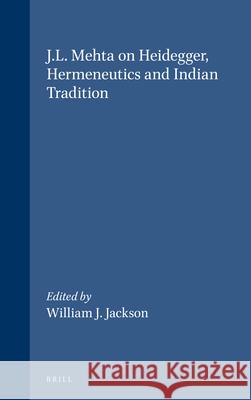J.L. Mehta on Heidegger, Hermeneutics and Indian Tradition » książka
J.L. Mehta on Heidegger, Hermeneutics and Indian Tradition
ISBN-13: 9789004094888 / Angielski / Twarda / 1992 / 210 str.
This book presents a selection of essays by the Indian philosopher J.L. Mehta on the topics of hermeneutics and phenomenology containing many original reflections on questions of interpretation and the creative retrieval and renewal of meanings from ancient traditions. Beginning with essays on sources of modern phenomenological methods, the work goes on to articulate principles of phenomenology and to apply them to the interpretation of Hindu traditions and texts. The final group of essays consider the problems of East-West understanding and issues of intercultural relationships and the possibilities of planetary thinking.
In the fourteen essays brought together here, Mehta elucidates the contributions of continental philosophers such as Husserl, Heidegger and Gadamer, and interprets meanings of the Rig Veda, Krishna in the Mahabharata, and the life of Sri Aurobindo. He also critically examines Western perceptions of India as a culture steeped in its own dreams, and explores the processes of rediscovering and re- appropriating through interpretation and translation one's ideological roots. The book contains an introductory and a concluding essay by the editor, contextualizing Mehta's life and studies. Thoughtful and provocative pieces by Wilhelm Halbfass and Raimondo Panikkar lead into the main body of the work.
This is an especially useful work because Mehta was a rare kind of international thinker. In his mature essays his thinking came full circle - having grown from Hindu origins, expanding through Western psychology and continental philosophy, and returning to re-assess profound questions in Indian thought.











